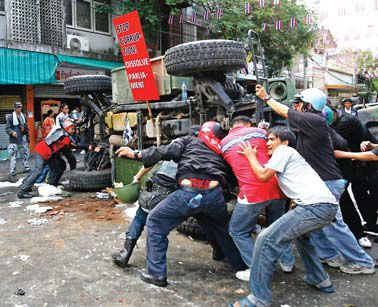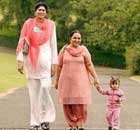Asia-Pacific
Thai protesters pledge to fight on
(China Daily)
Updated: 2010-04-12 07:09
 |
Large Medium Small |
Four soldiers among 21 killed in Thailand
BANGKOK - Thai "red shirt" protesters ruled out negotiations with the government on Sunday and said they would not give up their fight for early elections a day after clashes with security forces killed 21 people.
 Demonstrators try to topple an abandoned army armored vehicle on Sunday in Bangkok, Thailand. Clashes between protesters and soldiers killed 21 people in the country’s Residents are angry over line, but worst political violence in nearly two decades. [Agencies] |
At least 874 people were injured in what one newspaper called "The Battle for Bangkok". Protesters are demanding that the prime minister dissolve Parliament, call early elections and leave the country.
Dozens of foreign governments issued warnings for citizens visiting Thailand, where tourism is a lifeblood industry.
"The time for negotiation is up. We don't negotiate with murderers," "red shirt" leader Weng Tojirakarn said. "We have to keep fighting," he said.
Saturday's fighting, which erupted after security forces tried to disperse protesters, was the worst political violence in the country since 1992 and some of it in well-known Bangkok tourist areas.
Troops fired rubber bullets and teargas at thousands of demonstrators, who fought back with guns, grenades and petrol bombs. Four soldiers were among those killed.
Each side blamed the other for the violence. "Red shirt" leaders accused the military of opening fire into the crowds, while army spokesman Col. Sansern Kaewkamnerd accused protesters of firing live rounds and throwing grenades.
| ||||
A government spokesman said the military only fired live ammunition into the air.
Among those killed was Reuters TV cameraman Hiro Muramoto, a 43-year-old Japanese national. Japan's Foreign Ministry urged the Thai government to investigate Muramoto's death.
The "red shirts", mostly rural and working-class supporters of ex-premier Thaksin Shinawatra who was ousted in a coup in 2006, have occupied two main areas of the capital, a city of 15 million under a state of emergency since Wednesday. Still numbering in thousands, they made no attempt to come out of their bases on Sunday and troops did not make any move toward them.
Thai political historian Charnvit Kasertsiri said the violence was worrying because there was no outright win for either side and the chance of more fighting was high.
"The public didn't take it lying down and were responding in kind," he said. "When the government is no longer the only user of force, then it spirals into anarchy."
A government spokesman said there was a line of communication open with the "red shirts" but conditions were not right for formal talks.
"As long as they are still breaking the law, that makes it difficult," spokesman Panitan Wattanayagorn said. "We are not opposed to talking if it will solve the problems."
The opposition seemed in no mood to compromise.
"There is no turning back now," said Nida Singjaroen, 36, a farmer from eastern Surin province. "We are fighting till the end. We want an answer on what happened to our people and we want (Prime Minister) Abhisit Vejjajiva to show responsibility. He should be ashamed."
Kasem Prunratanamala, head of research at CIMB Securities (Thailand), said "tourism will be the very first sector to be hit and the Thai stock market should react negatively on Monday".
The protesters say Abhisit lacks a popular mandate after coming to power in a 2008 parliamentary vote following a court ruling that dissolved a pro-Thaksin ruling party. Thaksin's allies would be well-placed to win fresh elections.
The twice-elected Thaksin, in self-imposed exile since 2008 when he was sentenced to jail for graft, was despised by many of the Bangkok elite but is popular with the poor for policies like cheap healthcare and microcredit grants to villages.
AP contributed to the story
Reuters










